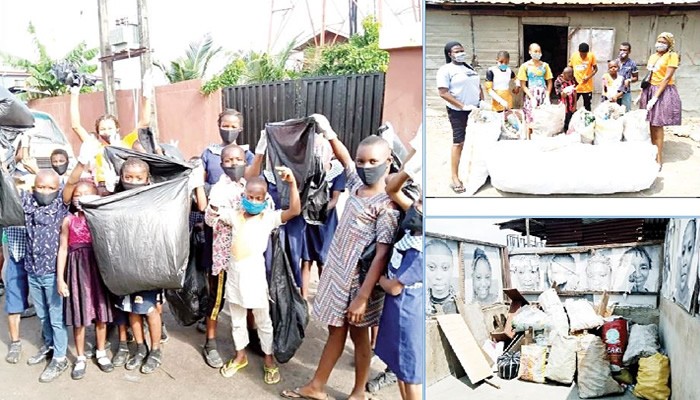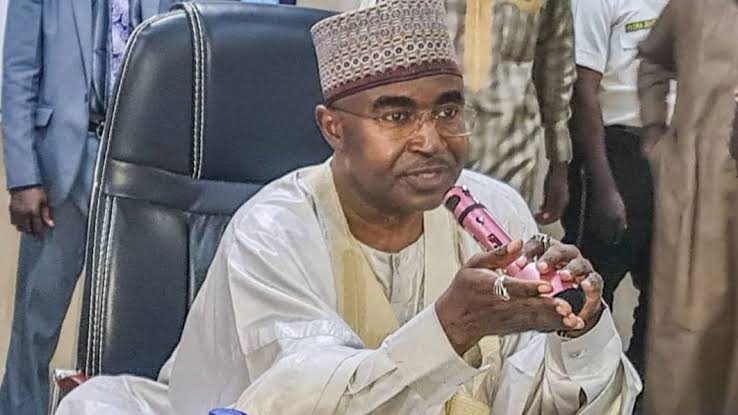World of Ajegunle women paying school fees with plastic bottles
Exhausted and worn down, Kemi Saheed finally arrived home that afternoon. She had just completed a gruelling four-hour journey to and from her residence in Ajegunle, a well-known slum community situated within the Ajeromi-Ifelodun Local Government Area of Lagos State. This highly populated area is inhabited by more than 550,000 residents from different parts of the country.
With a determined resolve, the 44-year-old relentlessly darted from one hotel to another, shop to shop, navigating numerous places, for a singular, heart-wrenching purpose – to amass plastic bottles.
For her, these bottles symbolised her lifeline to afford her children’s school fees and safeguard their education. Her sole target was to accrue a substantial stash before the bottles were retrieved by the recyclers, who diligently collected them in the morning.
Saheed had set out from her home at dawn last Monday, embarking on a quest to find plastic bottles. In this unconventional economy, education was the precious commodity, and plastic bottles were how she hoped to procure it.
“I feel like a trailer just ran over me,” she managed to utter before using her left hand to wipe off the sweat from her face gently.
“My firstborn was in school for a year because the former school she was in was sold, and we did not have money to pay for another school; hence, she had to stay at home that long to buy time. We eventually enrolled her in the kindergarten class at age five in Isrina Schools when we discovered we could pay the school fees with plastic bottles instead of cash. I also work as a nail technician, among other things, and the stress of the job took a toll on me. My children even helped collect plastic bottles.
“While returning from work, I pick enough bottles daily. We, as parents, are required to pick a minimum of seven sacks of plastic bottles and more to offset the fees. If we cannot pay, the proprietor’s parents (Mr Israel & Mrs Ifeaka Amuzie) come to our aid by helping us pick and provide basic needs like books, pens, uniforms, and even feed the children, among others. In addition, my children’s father does not contribute anything to the children’s education or the family.”
Expressing her distress, she added, “Even the wooden house we live in, for which we pay N150,000, we’ve been asked to leave because we can no longer afford it.”
Like Saheed, several residents of Ajegunle have learnt to endure such energy-sapping walks, viewing them as a necessary means to secure their children’s future.
Similarly, a 51-year-old woman of six children, Patience Onwuka, said two of her children recently graduated from Isrina Schools, leaving behind a two-year-old, the lastborn of the family.
She said, “When I started in this school, I did not have any money anywhere; the proprietor’s mother helped me because my children were home for a while and could not go to school till I got informed on how plastics could be used to pay school fees instead of cash. Also, I had to use cans to buy stationerery. My husband stays with me. However, I am the breadwinner of the family.
“I have been the one trying to sustain my family; even when I see where they are having a party, I immediately enter there to pack all the bottles, damming the consequence of being looked down upon so that my children can get a good education. Once we bring these bottles, they weigh it with a measuring instrument.”
After her husband’s demise, Victoria Eteimo, a 50-year-old widow, reflected on the challenging adjustment she and her children had to make when they moved to the Ajegunle neighbourhood.
She narrated, “Following the passing of my husband, things were so rough that my children could not go to school anymore; they were just at home. Then, a friend recommended Isrina Schools when she noticed my struggles. After waiting for three years at home, my daughter joined the school at seven.”
Another parent, Iyabo Kabiru, said she noticed the school was doing its best; she enrolled her children because they were burdened with the expenses of the high cost of living.
She said, “At the moment, I just have one child in the school, and the second child is coming. It was when I realised the school’s standard was not bad that I decided first to enrol my first child. I will enrol my second child soon; I have not done so because of financial constraints. I am doing it one by one because we also pay cash if we cannot pay with bottles.
“However, we have been facing challenges with the bottle collection because many other collectors, particularly men, are competing with us and collecting at a faster rate. Moreover, the school’s situation worsened following a significant fire incident that affected a large part of the Ajegunle area. This event has hurt the entire locality, including the reduced frequency of bottle collectors, who often blame the poor road conditions for their dwindling visits.”
Similarly, a 36-year-old parent, Omolara Abodunrin, mentioned that many parents who enrolled their children in school struggled to afford the tuition fees.
She said, “Presently, I have one child in the school, while two recently graduated. We find it difficult to pay; my husband is out of a job, and I have five children. I am the only one catering for all of them. My children and I wake up very early, by 4:00 am, to pick up plastic bottles from one place to another.
“We fervently appeal to the government to recognise the dire circumstances in which we find ourselves and kindly offer us assistance, as our community is mired in an ongoing and profound state of hardship and adversity,” the parent appealed.
Poor facilities
Stepping through the gates of the school compound, a world of innocence and learning unfolded. The compound housed the youngest souls, from preschool to basic 1.
An expansion had necessitated acquiring another space just a few blocks down the road. This newfound facility was earmarked for the older students, ranging from primary 2 to 5.
Intriguingly, the initial scene that met the gaze of our correspondent was the preschool area, a cluster of houses ingeniously transformed into two classrooms.
These makeshift structures, demarcated by wooden partitions, were teeming with little children. Their faces radiated with anticipation as they gathered for their assembly, a delightful precursor to the upcoming mid-term break.
Stepping outside, our correspondent ventured into the heart of the primary 2 to 5 classrooms. The setting was modest but well-kept, with small classrooms and narrow corridors where rows of neatly arranged bottles provided an unexpected contrast to the simplicity of the surroundings.
However, what was attention-catching was the state of the toilet facility. This basic necessity was a stark reminder of the challenges the school faced. The toilet, a structure constructed from zinc, stood forlorn and empty. Devoid of the essentials, it served merely as a place for students to relieve themselves, evoking a sense of bare necessity and a desire for improvement.
While speaking to our correspondent, the proprietor of the institution, Grace Amuzie, noted that they had been managing the toilet for years.
She said, “While all the students use the same area for urinating, only three to five potties are available for over 200 students to take turns when they need to defecate.”
Having over 200 students rely on a few potties, according to health experts, was not good enough.
The United Nations Children’s Fund recently said Nigeria must construct about 3.9 million toilets to achieve the open-defecation-free goal by 2025.
The UNICEF Chief of Water, Sanitation, and Hygiene, Jane Beva, disclosed this at the opening of a two-day maiden toilet business owners’ conference in Abuja.
Beva said Nigeria needed more toilet facilities, adding that only about 180,000 to 200,000 washrooms were built annually.
She raised the concern over the poor sanitation level in Nigeria, adding that the 2021 WASH national outcome routine mapping reported that 48 million people were still practising open defecation in the country.
The report also noted that 95 million Nigerians need access to essential sanitation services.
“About 1.3 per cent of GDP or N455bn is lost annually due to poor access to sanitation – health, health care savings and productivity. Every dollar invested in water and sanitation results in three to 34 dollars in economic benefits.
“Nigeria cannot continue business as usual, or it will miss the target of 2025 and 2030. There is a need to strengthen and scale up proven strategies to reach the country’s goals. The private sector must work closely with all tiers of government and communities to actively create sustainable solutions to address the sanitation needs of unserved and underserved communities and help grow capital investment and human capital.”
From the foregoing, the toilet facility in the Ajegunle school requires a total transformation, and the school is not unaware of it, according to findings by The PUNCH.
After primary school, what next?
While the name “Ajegunle” in Yoruba translates to ‘wealth has landed here,’ the stark reality of daily living for its residents was far removed from the promise of prosperity implied by its name. For most families, life has been a vicious circle of struggle and deprivation. Having seen some of their children out of primary school through the ingenious bottle-collection-payment mode, pursuing secondary education has been challenging due to the lack of money.
“We have to wait for the saving hands of scholarships, particularly for those who cannot afford public school levies of over N22,000,” one of the parents, Mrs Saheed, lamented.
“My 13-year-old daughter, who just finished primary school from Isrina Schools, is still at home because we have been unable to garner the required levies like tax clearance of N8,000, equating to N22,000, for payment to enrol her into a public secondary school,” she added.
In the case of Onwuka, she lamented that she did not know how to further the education of her just-graduated son.
She said, “After my son’s graduation since they do not take bottles in place of cash in public schools, I had to work hard before I could pay the public school levies required at the secondary school level. “
Explaining the bottle-for-school-fees initiative
The Isrina Schools’ proprietor explained that her motivation to establish the bottle-for-school-fees initiative stemmed from her educational journey, where she received sponsorship from a primary school for teacher training. However, once students complete primary school, they can attend public school with parental financial support or pursue academic scholarships.
She said, “We do not have any provision for secondary school; however, we try to procure academic scholarships for five of the children annually to further their education, being what we can afford for now.”
“Since we started in 2016, we have been able to go from four to 200 kids, providing academic scholarships and termly writing materials. Also, one of our key features is using recyclables, where parents bring plastics and then use them to pay their children’s school fees by partnering with the African Clean-Up Initiative.”








